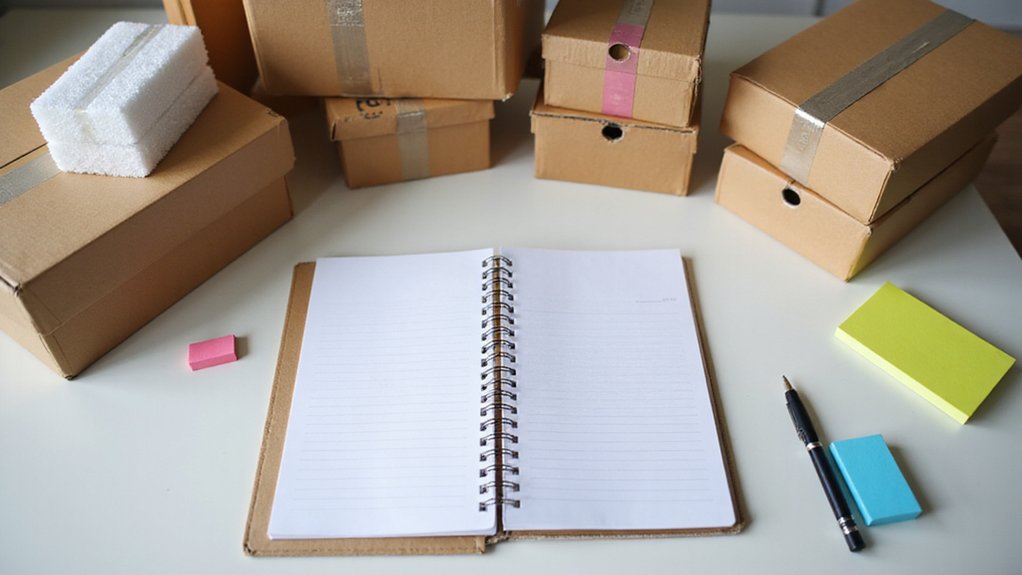Moving can blindside you with unexpected challenges, but it doesn't have to overwhelm you. You'll need a strategic approach that tackles every detail methodically. From packing fragile items to transferring utilities, each step requires careful planning and execution. Whether you're relocating across town or to a different state, having an extensive checklist will transform your moving experience from chaotic to controlled. Want to know how to stay one step ahead of potential moving mishaps?
Key Takeaways
- Create a comprehensive moving timeline starting 8 weeks before relocation, systematically organizing tasks like decluttering, packing, and utility transfers.
- Develop a detailed inventory of all belongings, categorizing items by room and prioritizing what to keep, donate, or discard.
- Secure reliable moving services by researching company reputations, comparing prices, and understanding insurance and transportation logistics.
- Prepare essential documentation including address change forms, utility transfer paperwork, and personal identification for smooth administrative transitions.
- Pack strategically with labeled boxes, protective materials for fragile items, and a dedicated "first night" personal survival kit containing immediate necessities.
Planning Your Move: 8 Weeks Before Relocation
When you're eight weeks out from moving day, it's time to kick your planning into high gear. Start your decluttering process by sorting through your belongings, deciding what to keep, donate, or discard.
Downsizing considerations are pivotal now, as reducing your inventory can save money and simplify your move. Create a detailed inventory of your items and research moving companies. Set a budget for moving expenses and begin collecting packing supplies.
Notify important contacts about your upcoming address change, and start organizing important documents. Your future self will thank you for being proactive. Consider professional moving services like Syracuse Moving Company, which offers comprehensive local and long-distance moving assistance.
Packing Strategies and Supply Management
Because packing can feel overwhelming, strategic preparation is key to a smooth moving experience. Expert box packing techniques by categorizing items and labeling each container clearly.
Invest in sturdy boxes, packing tape, bubble wrap, and markers to optimize your inventory management process. Start with less-used rooms and pack systematically, creating an organized approach that reduces stress.
Protect fragile items with proper wrapping and cushioning, and consider color-coding boxes by room for easier unpacking. Don't overload boxes, keeping them at a manageable weight to prevent potential damage or personal strain during your move.
For complex items like heavy furniture and appliances, consider hiring trained moving professionals who can safely handle specialized relocations.
Utility and Address Transfer Essentials
If you're planning a move, transferring utilities and updating your address are critical steps that can't be overlooked. You'll want to tackle these tasks systematically to guarantee a smooth shift.
Contact utility providers 2-3 weeks before moving to schedule disconnection and reconnection. Complete address change paperwork with USPS, banks, and important organizations. Gather necessary documentation for utility bill setup at your new residence.
Don't let administrative tasks overwhelm you. Stay organized, and you'll minimize potential interruptions during your move.
Moving Day Preparation Checklist
After handling utility transfers and address updates, you'll want to focus on your moving day preparations.
Start by decluttering essentials and organizing important documents in a clearly labeled folder. Pack a personal "first night" box with critical items like toiletries, chargers, and a change of clothes.
Double-check your moving truck reservation and confirm details with your movers. Prepare a moving day survival kit with snacks, water, and basic tools.
Create a final checklist to guarantee nothing gets left behind, giving you peace of mind during this potentially stressful shift.
Transportation and Logistics Coordination
How will you make sure your belongings arrive safely and on time during a move? Conveyance and logistics coordination are essential to a smooth relocation. Consider these key steps:
- Research vehicle rental options that match your moving needs
- Carefully evaluate professional movers' reputation and pricing
- Create a detailed timeline for loading, transport, and unloading
You'll want to compare moving truck sizes, understand mileage rates, and verify insurance coverage. Professional movers can simplify your journey, reducing stress and potential damage to your cherished possessions.
Choose wisely, plan meticulously, and you'll manage this change with confidence and peace of mind.
First Week in Your New Home Survival Guide
Whether you're excited or overwhelmed, settling into your new home requires strategic planning and patience. Start by prioritizing your unpacking essentials: bedroom, bathroom, and kitchen items.
Tackle home setup tasks systematically, creating functional spaces that reflect your lifestyle. Unpack critical boxes first, setting up basic necessities like bedding, toiletries, and cooking equipment. Don't stress about perfecting everything immediately; focus on creating comfortable, livable spaces.
Take breaks, stay hydrated, and remember that organization is a process. Your new home will come together gradually, so be kind to yourself during this changeover.
Frequently Asked Questions
How Much Should I Tip Professional Movers?
You'll want to tip movers $4-$5 per hour per mover for standard jobs, or 10-15% of total cost for complex moves lasting over 4-5 hours, depending on service quality and difficulty.
Are Moving Expenses Tax-Deductible for My Relocation?
You can't deduct moving expenses unless you're an active-duty military member. For others, home office deductions and job-related expenses won't cover relocation costs under current tax laws.
What Insurance Coverage Do I Need During My Move?
You'll need rental or homeowner's insurance coverage during your move. Protect your belongings and vehicle transit risks. Consider short-term policies that bridge gaps between old and new residences, ensuring your freedom from unexpected financial burdens.
How Can I Protect Valuable and Fragile Family Heirlooms?
You'll want to carefully wrap heirlooms in bubble wrap and soft packing materials. Store prized possessions securely in padded, lockable containers. Consider transporting irreplaceable items personally for maximum protection during your move.
Should I Hire Movers or Move Everything Myself?
You'll want to weigh the pros and cons carefully. A cost comparison reveals DIY moving saves money, but professional movers offer convenience and less physical strain. Your freedom depends on budget and comfort level.


